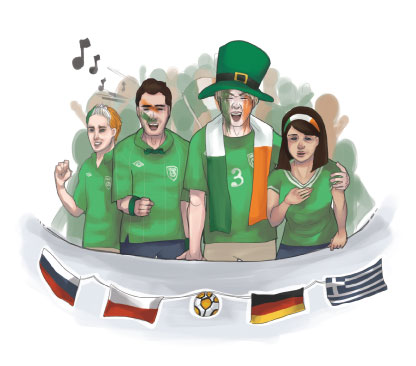
Down 4-0 with only several minutes to play against the reigning world champions and on the verge of elimination from the UEFA European Football Championship, Irish fans refused to go down quietly.
They got up on their feet with tears streaming down their faces and, in their loudest voices, sang their sporting anthem, “The Fields of Athenry.” Uninterrupted and unwavering, the Irish belted out their ballad with pride.
Set during the Great Irish Famine, the song symbolizes the unrelenting and unbreakable spirit of the Irish people in times of political unrest, poverty and forced immigration, and was eventually adopted as the nation’s sporting anthem.
The hallowed ballad stopped the soccer world. Commentators calling the game from across the world noted the sheer passion in its purest form. The German commentators refused to speak in the final minutes allowing audiences to absorb the ambience of true love for one’s team.
I don’t cry during television shows or movies, I just don’t. Not even during “Titanic.” But this display of holding on, of resolute love ““ this got to me. I’ll confess. I welled up a bit.
While I love the 8-clap just as much as the next guy, to see unadulterated fervor in the form of a chant, turn nowhere else than to soccer.
Although soccer hasn’t completely taken off in the United States ““ it’s not considered one of the country’s top four sports ““ it has garnered some respect on the UCLA campus. Important matches in the English Premier League, La Liga and UEFA Champions League have seats by the big screen in Ackerman Union packed with fans.
The sport is still growing in the U.S. and the viewership of the Euro really emphasizes how far appreciation of soccer has come.
(Thanks, David Beckham?)
Through the first eight matches of the Euro Championship, ESPN was averaging 1,260,000 viewers ““ an 183 percent increase from the first eight games of Euro 2008. Keep in mind that games are also broadcasted live at 9 a.m. and 11:45 a.m. Pacific Daylight Time, times at which a large viewing audience could be busy.
And while many complain of the lack of scoring or plethora of statistics in soccer, I feel that maybe some off-the-field aspects may appeal to broader audiences.
For all you history or political science students out there, you of all people should know well the chronicled pasts of these European countries.
When host Poland took on Russia, politics and history erupted as the tumultuous past found its way onto the pitch. The countries have a troubled relationship, dating back to the Middle Ages, all the way back to a four-decade Russian dominance of Poland.
Before the match, which was coincidentally scheduled on Russia Day, more than 5,000 Russians celebrated the end of the Soviet Union by marching through Warsaw, offending many Poles in the process.
Riots broke out, resulting in hundreds of arrests as blood covered the streets.
The host Poles didn’t take it too lightly when Russian fans spread out a flag large enough to cover thousands that stated, “This is Russia,” with a medieval warrior carrying a sword and shield.
Hundreds of riot police lined the field in anticipation of a second round of the riots that occurred prior to the game.
And for all you economics students, how could you not be fascinated by the undertones of the Greece v. Germany quarterfinal game?
Germany, heavy favorites to win the entire competition, took on underdog Greece in the quarterfinals, which surprisingly advanced past the group stage of play. This situation parallels that of the economic predicament in the eurozone. Greece is in the midst of a crisis requiring an international bailout. And who better to be one of the major creditors to Greece than Germany, Europe’s biggest economy?
Germany is spearheading strict efforts to make sure Greece maintains its economic reforms, which have become very unpopular as the situation has yet to improve and homelessness in Greece continues to increase.
These matches are fueled by historical anecdotes that make for intriguing scripts even James Cameron couldn’t come up with.
But what more inspiration does one need than what can be seen in the stands? Such unyielding passion is seldom seen in any other sport. The singing and chanting is unprompted and spontaneous ““ originating from the soul of the fans ““ and unlike at UCLA sporting events, not from someone in a blue polo and cargo shorts clapping his or her hands sporadically.
These fans ride emotional roller coasters game-in and game-out with reactions often ending in either tears of sorrow or tears of pure elation.
But off-field attractions of historical storylines and fanaticism that encapsulates entire nations are just a couple of the things that can attract all audiences.
While these elements off the field may be where a love for the game can begin, there is still so much underneath what is considered “the beautiful game.” I could go on for days, but these reasons are just the tip of the iceberg. Give the euphoria of the Euro Cup a chance and maybe you’ll find yourself singing “Hail to the Hills of Westwood” in light of any score.
What do you think should be the sporting anthem of the U.S.? Email Nguyen at cnguyen@media.ucla.edu or tweet @chrisnguyen1992 .
